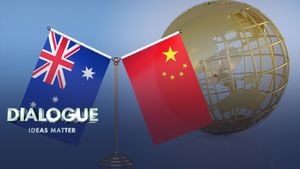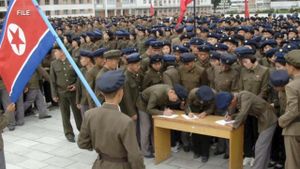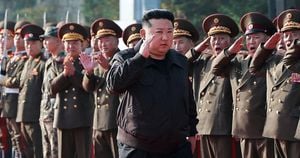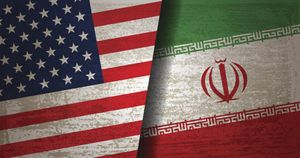North Korea's military moves have stirred considerable concerns globally, especially with the war raging on between Russia and Ukraine. Recent intelligence reports have hinted at North Korea's potential military assistance to Russia, raising questions about the repercussions of such actions on international security and relations. Amidst this backdrop, U.S. officials and allies are closely monitoring these developments, with the tension between the global powers showing no signs of easing.
The Korean Peninsula has historically been characterized by militaristic posturing and high-stakes diplomacy. Recently, North Korea has increased its military exercises and weapon testing, showcasing its missile capabilities. This escalation isn’t merely local—it appears North Korea is not shying away from potentially siding with Russia, which could create ripples across the geopolitical waters.
Documents obtained by Western intelligence agencies indicated plans where North Korea could send artillery shells and rockets to support Russian efforts. If these reports hold true, this would not only signify North Korea's growing assertiveness on the world stage but could also lead to escalated tensions, particularly with NATO allies who are supporting Ukraine.
U.S. officials have voiced their alarm over these developments. They argue the transfer of arms from North Korea could significantly aid Russia’s military operations. At the same time, this cooperation could provide North Korea with much-needed financial resources and military technologies, making it a two-way street. This situation paints a vivid picture of how desperate times may lead to unlikely alliances between nations often viewed as adversaries.
Analysts have pointed out the parallels between North Korea and Russia's current confrontations, noting both countries feel increasingly isolated from the West. North Korea is grappling with severe economic sanctions, largely due to its nuclear ambitions and repeated missile tests. Russia, on the other hand, faces similar sanctions stemming from its invasion of Ukraine. This shared predicament could push them closer together, with military cooperation as one possible avenue.
For South Korea and Japan, this alliance poses existential threats. Both nations, historically wary of North Korean aggression, now face the prospect of military equipment finding its way to Russian forces. It amplifies the urgency for these countries to reinforce ties with the United States and bolster their own defense mechanisms.
Regional dynamics are shifting too, as North Korea's outreach toward Russia complicates alliances and tensions all around. South Korea’s President Yoon Suk-yeol has asserted the need for stronger deterrence measures against North Korean threats. This is likely to include joint military drills with U.S. forces, aimed at showcasing readiness against any potential aggression from the North.
Public discourse around this issue has delivered mixed reactions. Some analysts argue it’s about deterrence, stating the need for global powers to showcase strength. Others express concern about the risk of miscalculations leading to broader conflict. The current state of play leaves countries pondering how best to respond not just rhetorically, but through decisive action.
The potential for arms assisting Russia from North Korea beckons more serious discussions about international law and adherence to United Nations sanctions. There’s pressure mounting on the international community to address this concerning alliance proactively.
Growing evidence of North Korea's military intentions raises alarms about the impact on the balance of power, not only within the regions directly affected but globally. Historical contexts suggest the erroneous belief during times of conflict can yield dangerous decision-making. Increasing military cooperation among nations viewed with skepticism by the West calls for immediate international dialogue.
Geopolitical analysts have underscored the necessity for the U.S. and its allies to counter this military cooperation effectively. This might involve increasing scrutiny on North Korea’s supply chains and enhancing diplomatic relations with countries capable of mitigating this developing alliance.
Alongside these military concerns, humanitarian aspects cannot be ignored. North Korea’s willingness to engage with Russia generates questions about its own economic struggles and the lengths it will go to secure alliances detrimental to the broader international community. The plight of North Korean citizens remains grim, and observers have urged for humanitarian support to continue amid such political maneuvering.
The question now looming large over international politics is: What measures can be taken to preemptively disrupt the militaristic partnership between North Korea and Russia?
While time will tell how the situation develops, the concerted focus should remain on diplomatic avenues and practical strategies for maintaining stability. With looming sanctions and sustained military presence on both fronts, stakeholders are left contemplating how best to navigate this challenging terrain.
Future military gatherings must not only address the immediate threats but also devise plans to engage with North Korea from different angles, addressing both their military aspirations and fundamental human welfare. Striking the right balance could enable incremental progress toward disarmament, moving the conversation beyond mere conflict and speculations.
To sum it up, the interplay of military action and international diplomacy remains at the forefront as North Korea advances its relationship with Russia. The intertwining of national security with humanitarian concerns makes for a complex narrative worth unraveling, with the world watching closely for signs of change.



